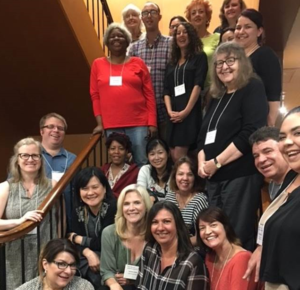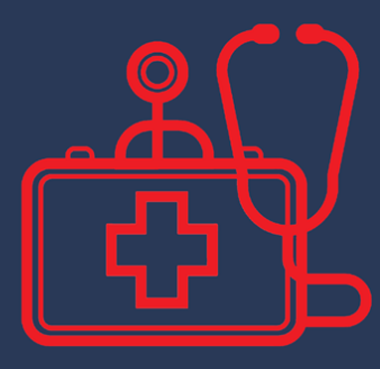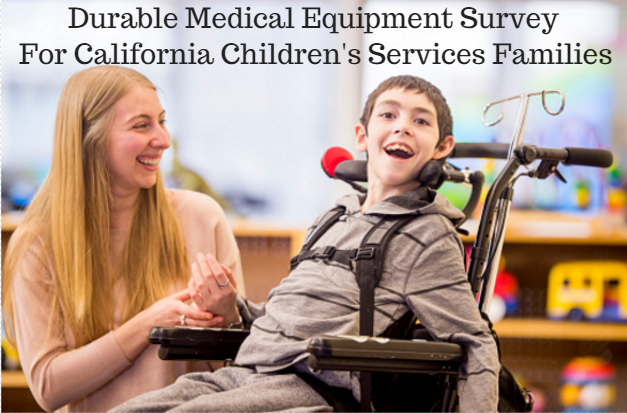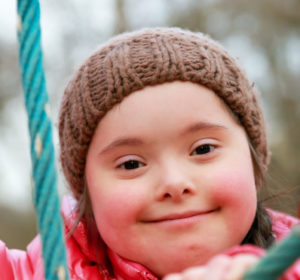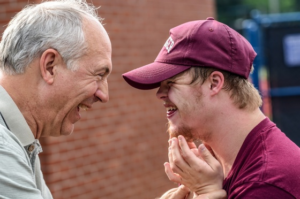This newsletter was sent May 23, 2017. If you’d like to receive our next bi-weekly digest full of a curated collection of resources, workshops, policy highlights, and action items that affect children and youth with special health care needs, please sign up here.
Family Voices Hosts Southern California Project Leadership Alumni Luncheon May 6
The Eastern Los Angeles Family Resource Center hosted the Southern California Project Leadership Alumni Luncheon on May 6. Graduates, trainers, and Family Voices council members traveled from Los Angeles, San Bernardino, San Diego, and Santa Barbara for the event. Disability Rights California Emeritus Marilyn Holle, First 5 Los Angeles Program Officer Cristina Peña, and Senator Holly J. Mitchell’s District Director Sydney Kamlager-Dove shared their expertise on advocacy and offered tools for success as parent advocates.
In the breakout sessions, First 5 Los Angeles Government Affairs Officer Ruel Nolledo led the discussion on current policy issues surrounding Medi-Cal, Eastern Los Angeles Family Resource Center Executive Director Yvette Baptiste addressed California Children’s Services, Mental Health Advocacy Services Senior Attorney Nancy Shea spoke on mental health services, and Marilyn Holle discussed developmental disability services. Group members described their own experiences with these services and brainstormed ways for parents to get involved. Graduates enjoyed a networking lunch, and all left feeling inspired to continue their advocacy and leadership work on behalf of children and youth with special health care need (CYSHCN).
For more information on Project Leadership, a training program that introduces individuals to the nuts and bolts of advocacy on behalf of CYSHCN, click here.
RESOURCES
The National Health Law Program Launches New ‘Protect Medi-Cal Funding’ Blog Series
The National Health Law Program recently began a 12-part weekly blog series highlighting the importance of Medi-Cal for various populations within California. The first issue brief addresses how cuts to the program would harm children, and the second brief focuses on women and Medi-Cal. To read the blog, click here.
The Impact Of The American Health Care Act On Children’s Hospitals: Preparing For The Road Ahead
The Chartis Group has produced a white paper analyzing the impact the American Health Care Act (AHCA) would have on children’s hospitals. The paper notes that children’s hospitals have become increasingly dependent on Medicaid as their primary payer, so a reduction in Medicaid funding (as proposed in the AHCA) would reduce access, coverage, and payments for children’s services. In this event, the analysis outlines two possible options: hospitals would have to seek more commercially insured children and limit their Medicaid patients, or they’d have to transform their care models. To read the white paper, click here.
New And Updated Financing Strategies For Children And Youth With Special Health Care Needs
The Catalyst Center has updated their website to reflect six additional financing strategy categories for children and youth with special health care needs (CYSHCN): behavioral health, benefits counseling, family supports, foster care, inequities, and relief funds. These new categories are based on structured interviews with Title V/CYSHCN programs, Medicaid agencies, and family leader organizations focusing on the financing of care and coverage for CYSHCN. In addition, the Catalyst Center has updated their five existing financing strategies with new examples of innovative polices and practices. To read more, click here.
OPPORTUNITY FOR INPUT
AMCHP Seeking ‘Innovation Station’ Submissions For Emerging Maternal And Child Health Practices In Title V Programs
The Association Of Maternal And Child Health Programs (AMCHP) is looking for submissions of cutting edge, emerging, promising, and best practices in maternal and child health from Title V programs and public health agencies. These examples will contribute to their Innovation Station, a growing online database of what’s working in maternal and child health. For more information on how to submit your practice, click here.
Related: Family Voices Of California’s Project Leadership program was highlighted last year as a ‘promising practice’ — check it out here.
Help Secure Money In State Budget To Enforce Stricter Psychotropic Drug Guidelines For Foster Children
The National Center For Youth Law (NCYL) is requesting that $80,000 be added to the state budget to help prevent the over-prescribing of psychotropic drugs to foster youth. The money would be used to enforce dosage guidelines and ensure youth prescribed psychotropic drugs have access to psychiatric services in conjunction with medication. The NCYL is urging advocates to call key decision-makers and ask them to support the budget request. For phone numbers and a phone script, click here. For more information, check out the NCYL’s fact sheet here and the state auditor’s recommendations here.
WEBINARS
May 24: Understanding Savings And Investor Choices For ABLE Account Owners
Hosted by: The National Disability Institute
More information and registration here.
May 24: Where Medicaid Stands: From The American Health Care Act To State Waivers
Hosted by: The National Institute For Health Care Management Foundation
More information and registration here.
May 24: Is Hemophilia A Secret? Disclosure In A World Filled With Technology
Hosted by: The National Hemophilia Foundation
More information and registration here.
May 25: Moving Beyond Cooperation: Engaging Families In Health Care Organizations And Practices
Hosted by: The National Center On Medical Home Implementation
More information and registration here.
May 25: Giving Medicine To Kids: Dosing, Droppers, And Other Dos And Don’ts
Hosted by: The American Academy Of Pediatrics
More information and registration here.
May 25: Diversity And Language In Patient Engagement
Hosted by: The Center For Care Innovations
More information and registration here.
May 30: Handheld Technology Supports And Transition To Employment
Hosted by: The Center On Technology And Disability
More information and registration here.
June 8: Promoting Child And Family Well-Being Through Civil Rights Compliance
Hosted by: The Center For The Study Of Social Policy
More information and registration here.
June 13: Toward Rapid-Acting Treatments For OCD
Hosted by: The Brain & Behavior Research Foundation
More information and registration here.
June 20: Supporting Families Impacted By Zika
Hosted by: The CityMatch Learning Network
More information and registration here.
ARTICLES
NPR’s 1A Podcast Recording: Covering Kids After Obamacare
Parents Of Sick Children Fear Trap If States Have Say On ‘Preexisting Conditions’
New Medicaid Waiver Rule Delayed
Trump’s 4T Budget Arrives On Capitol Hill
F.D.A. Warns Of Faulty Lead Testing In Children And Mothers
In California, Some Families Think Twice About Keeping Undocumented Children On Medicaid
My Son Has Down Syndrome: The GOP’s Health Care Bill Scares Me To Death
Who Will Care For Abril? Parents Fear For Their Disabled Child If They Are Deported
Can California’s Most Vulnerable Survive Obamacare’s Replacement?
Racial And Ethnic Disparities Persist In Sudden Infant Deaths
As GOP Tarries On Health Bill, Funding For Children’s Health Languishes
For Mother Of A Child Born With A Severe Heart Condition: The Time To Act Is Now
Study: Many Parents In Need Can’t Find Mental Health Care For Their Children

